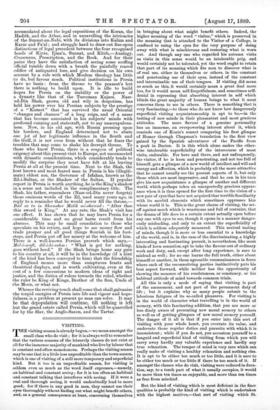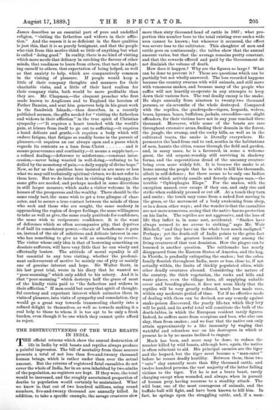VISITING. T HE visiting season is already begun,—we mean amongst the
small class who do visit ; for it is always well to remember that the various seasons of the leisurely classes do not exist at all for the immense majority of mankind who live by labour that is constant and often monotonous. Perhaps the visiting season may be one that is a little less unprofitable than the town season, which is one of visiting of a still more temporary and superficial kind. But it too is an unprofitable season, for visiting is :seldom even as much as the word itself expresses,—namely, an habitual and constant seeing ; for it is too often an habitual and constant talking that interferes with seeing. If it were a real and thorough seeing, it would undoubtedly lead to more good; for if there is any good in men, they cannot use their eyes thoroughly without finding out what might benefit others, and, as a general consequence at least, concerning themselves
in bringing about what might benefit others. Indeed, the higher meaning of the word " visitor," which is preserved in the meaning that is attached to the Visitor of a College, is confined to using the eyes for the very purpose of doing away with what is mischievous and restoring what is worn out. And though any one who regarded his autumn visits as visits in this sense would be an intolerable prig, and would certainly not be tolerated, yet the word ought to retain that part of its meaning which fits men to discover what is of real use, either to themselves or others, in the constant and penetrating use of their eyes, instead of the constant and interminable use of their tongues. If visiting did mean as much as this, it would certainly mean a great deal more too, for it would mean self-forgetfulness, and sometimes self- denial in repressing that absorbing interest in self which blinds the great majority of human beings to what it most concerns them to see in others. There is something that is very fascinating,—to those who do not know how dangerously superficial visiting acquaintanceship is apt to be,—in the tasting of new minds in their pleasantest and most gracious attitudes. The mere flavour of a genuine personality has an immense, an overpowering interest about it, which reminds one of Keats's sonnet comparing his first glimpse of Homer through Chapman's translation to the first view gained by the Spanish adventurer of the Pacific from a peak in Darien. It is this which alone makes the other- wise intolerable superficiality of the intercourse of most visits, endurable. For here and there, and not unfrequently, the visitor, if he is keen and penetrating, and not too full of himself, gets a glimpse of a new world of intellect and will and energy and affection, which is probably all the more attractive that he cannot usually see the poorest aspects of it, but only those which are most impressive, and that he can in his turn give his new acquaintance a glimpse of another and different world, which perhaps takes an unexpectedly gracious appear- ance when it is thus opened for the first time to the vision of a new pair of eyes that have not acquired that terrible familiarity with its morbid elements which sometimes oppresses him whose world it is. This is the great charm of visiting, the set- off against much which is wearisome and full of restraint, that the drama of life does to a certain extent actually open before any one with eyes to see, though it opens in a manner danger- ously misleading, and only to an extent the superficiality of which is seldom adequately measured. This mutual tasting of minds, though it is more or less essential to a knowledge of the world, and is, in the case of the discriminating, a highly interesting and fascinating pursuit, is nevertheless, like most kinds of keen sensation, apt to take the flavour out of ordinary work and duty, and, except after long experience, is sure to mislead as well ; for no one learns the full truth, either about himself or another, in these agreeable reconnaissances in force where each of the reconnoitring parties instinctively puts his best aspect forward, while neither has the opportunity of showing the measure of his resoluteness, or constancy, or his habitual attitude of mind towards common trials.
All this is only a mode of saying that visiting is part of the amusement, and not part of the permanent duty of life ; but it explains why so many people submit to the laborious fatigues of its so-called pleasures. For visiting is in the world of character what travelling is in the world of scenery, with this fascinating addition, that you are more or less dimly aware of presenting new moral scenery to others as well as of getting glimpses of new moral scenery yourself. The danger of it all is that if you enter into this sort of visiting with your whole heart, you overrate its value, and underrate those regular duties and pursuits with which it is inconsistent ; while if you do not, you accustom yourself to a languid and superficial kind of visiting from which you will carry away hardly any valuable experience and hardly any true relaxation. The temper of mind is very rare which can really make of visiting a healthy relaxation and nothing else. It is apt to be either too much or too little, and it is sure to be either too much or too little if there be too much of it. If amongst the classes who do visit, visiting were reduced in dura- tion, say, to a tenth part of what it usually occupies, it would be more than ten times as enjoyable, and more than ten times as free from mischief.
But the kind of visiting which is most deficient in the finer qualities is probably the kind of visiting which is undertaken with the highest motives,—that sort of visiting which St. James describes as an essential part of pure and undefiled religion, "visiting the fatherless and widows in their afflic- tion." And the reason it is so deficient in the finer qualities is just this, that it is so purely benignant, and that the people who visit from this motive think so little of anything but what is called " doing good." In reality, there is no kind of visiting which more needs that delicacy in catching the flavour of other minds, that readiness to learn from others, that tact in adapt- ing oneself to others, that expectation of being helped, as well as that anxiety to help, which are comparatively common in the visiting of pleasure. If people would keep a little of their company thoughts and manners for their charitable visits, and a little of their hard realism for their company visits, both would be more profitable than they are. Mr. Chapman,—the eloquent preacher who first made known to Anglicans and to England the heroism of Father Damien, and sent him generous help in his great work in the Sandwich Islands,—thus describes, in a recently published sermon, the gifts needed for " visiting the fatherless and widows in their affliction" in the true spirit of Christian sympathy :—" It requires a heart touched with the world's pain, at leisure from itself to go out to suffering,—it requires a hand delicate and gentle,—it requires a body which will endure fatigue, that fatigue so readily borne in the pursuit of pleasure,—it requires an ear always open and a purse which
regards its contents as a loan from Christ and it means perseverance and continuity,—it means a supple tact,— a refined dealing,—deference to misfortune,—constant inter- cession,—never being wearied in well-doing,—refusing to be dulled by the monotony of pain,—a daily supply of divine hope." Now, so far as the qualities here insisted on are more or less what we may call technically spiritual virtues, we do not refer to them here. But we do insist that in visiting the unhappy, the same gifts are needed, and perhaps needed in some directions in still larger measure, which make a visitor welcome in the houses of the prosperous and the wealthy. There should be the same ready tact, the same wish to get a true glimpse of char- acter, and to secure a true contact between the minds of those who seek and those who are sought, the same modesty in approaching the region of deeper feelings, the same willingness to take as well as give, the same ready gratitude for confidence, the same wish to reciprocate confidence. It is the want of deference which so often accompanies pity, that deprives it of half its consolatory power,—the air of beneficence it puts on, instead of the air of solicitous and delicate interest in one who has something to give as well as something to receive. The visitor whose only idea is that of bestowing something on desolate sufferers, will have very little that he can wisely and effectually bestow. The attitude of moral equality is all but essential to any true visiting, whether the predomi- nant undercurrent of motive be mainly one of pity or mainly one of genuine interest and hope. Sir Walter Scott, in Iris last great trial, wrote in his diary that he wanted no " poor-manning," which only added to his misery. And it is that " poor-manning " which destroys half the grace of most of the kindly visits paid to " the fatherless and widows in their affliction." If men could but carry that spirit of thought- ful courtesy and expectant interest which animates them in visits of pleasure, into visits of sympathy and consolation, they would go a great way towards transmuting charity into a refined delight to themselves, as well as towards making it a real help to those to whom it is too apt to be only a fresh burden, even though it be one which they cannot quite afford to reject.



































 Previous page
Previous page